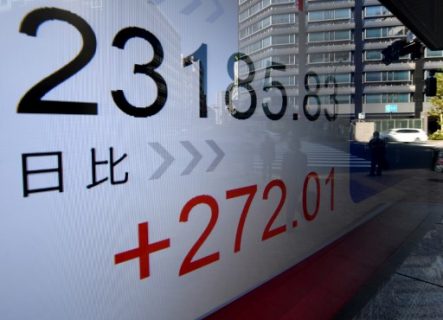
HONG KONG, China (AFP) — Asian markets headed into the weekend on a negative note on Friday as traders fret over the outlook for Donald Trump’s much-vaunted tax-cut plans while profit-takers cashed in after the latest rally.
The losses extended the broad regional sell-off Thursday, which started when Tokyo’s Nikkei saw a two percent gain in the morning reverse to a 1.7 percent loss at one point.
While investors will be keeping an eye on a meeting of Asia-Pacific leaders, including Donald Trump and Xi Jinping, in Vietnam this weekend their main focus is on Washington, where Republican lawmakers are struggling to agree on a fiscal reform bill.
Global markets were sent surging last month when Trump’s administration unveiled a plan to slash taxes across the board in a bid to fire up the US economy.
But in recent days it has emerged Republicans have differing ideas about how to push them through, with senators calling for a one-year delay to corporate tax cuts, among other things.
“The delayed phase-in of the corporate tax cut, an increase in the repatriation tax, as well as other walk-backs… have knocked stocks in the US and across the globe lower,” said Greg McKenna, chief market strategist at AxiTrader.
‘Challenging’
House Speaker Paul Ryan insisted the details will be “ironed out” between the two competing plans but analysts said there are worries the overhaul could succumb to party infighting in the same way Trump’s healthcare reforms were killed.
“Given the apparent differences between the two bills, the implementation of tax reform before the end of the year looks pretty challenging and achieving it before Thanksgiving (November 23rd) seems close to impossible,” said Rodrigo Catril, FX Strategist at National Australia Bank, in a commentary.
The uncertainty has dug into the dollar, sending it down against its major peers, particularly the yen, which has hurt Japanese exporters. By lunch in Tokyo the Nikkei was down 1.4 percent, having chalked up a 26-year high earlier in the week.
Other markets were also in the red. Hong Kong and Shanghai each fell 0.2 percent, while Sydney shed 0.4 percent, Seoul 0.5 percent and Singapore 0.3 percent. Wellington and Taipei also retreated.
Oil prices eased slightly but analysts say they could press higher on growing tensions in the crude-rich Middle East after Saudi Arabia accused Iran of “direct military aggression” over a missile attack near Riyadh by Tehran-backed Yemeni rebels.
“Sanctions against (major producer) Iran will take a significant amount of supply offline,” said Shane Chanel, equities and derivatives adviser at ASR Wealth Advisers.
Key figures around 0230 GMT
Tokyo – Nikkei 225: DOWN 1.4 percent at 22,552.06 (break)
Hong Kong – Hang Seng: DOWN 0.2 percent at 29.083.32
Shanghai – Composite: DOWN 0.2 percent at 3,422.76
Euro/dollar: UP at $1.1650 from $1.1642 at 2200 GMT
Pound/dollar: UP at $1.3146 from $1.3145
Dollar/yen: DOWN at 113.38 yen from 113.42 yen
Oil – West Texas Intermediate: DOWN 11 cents at $57.06 per barrel
Oil – Brent North Sea: DOWN 12 cents at $63.84
New York – DOW: DOWN 0.4 percent at 23,461.94 (close)
London – FTSE 100: DOWN 0.6 percent at 7,484.10 (close)
© Agence France-Presse







